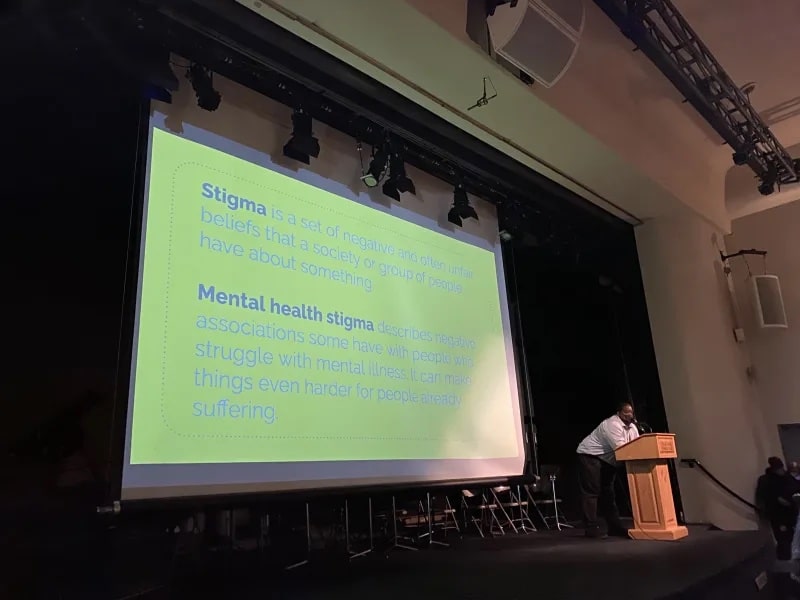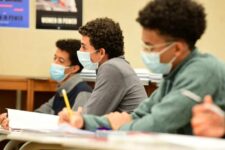On a Thursday in early December, the Fieldston Upper School Mental Health Club hosted its annual assembly — a time for students, faculty, and staff to be in community and support one another surrounding the topic of mental health. This year marked the fourth time the club hosted the assembly, and, just as in past years, the event featured members of the Fieldston Upper community sharing their stories and experiences in an effort to both spread awareness and normalize conversations surrounding mental health. “The main mission of our club is to destigmatize mental health and mental illness both in and outside of Fieldston,” says Sophie D. ’22, one of the leaders of the Mental Health Club.
Here, we share three takeaways from this year’s assembly.
Vulnerability leads to empathy and connection
“Practicing vulnerability is one of the first steps we can take to develop a better sense of empathy and community,” says Isabella B. ’22, one of the leaders of the Fieldston Upper Mental Health Club.
During the Mental Health assembly, several students and faculty spoke openly about their struggles with mental health. Through these moments of shared vulnerability, the ECFS community aims to foster empathy and a culture of compassion and grace. “We can never deeply and fully understand anyone else’s lived experience,” explains KC Cohen ’92, Fieldston Middle and Upper Director of Health and Wellness and one of the co-advisors to the Mental Health Club. “What we’re asking is to listen to other people’s stories, believe them, and try to offer empathy.” Being vulnerable often feels like a risk, but by modeling it in assemblies like this, Fieldston Upper is working to create a community in which everyone feels safer to speak their truth, tell their story, and ultimately to be themselves.
You are not alone
The COVID-19 pandemic has led to an increase in mental health challenges, especially in adolescents. At the beginning of this academic year, more than 100 Fieldston Upper students signed up to join the Mental Health Club. The Mental Health assembly, which was organized and led by the student club leaders, was a time for Fieldston Upper to be together, to remind anyone who is struggling with mental health issues that they are not alone, and to encourage everyone to reach out if they are struggling with how to get support for themselves or others.
Cohen, who attended ECFS in the 1990s, says that a significant change from her time at the School to now is how openly and honestly mental health is discussed, which she explains can help people feel less alone in their own struggles. In her time as a student, Cohen says that mental health struggles were just as prevalent, but they were not discussed in school — at least not openly. “The subject just wasn’t named,” explains Cohen. “Now we’re offering awareness around the complexities and prevalence of mental health challenges, and normalizing there being space to talk about it.”
Following the Mental Health assembly, the club hosted round table discussions for any students, faculty, and staff who wanted additional time and space to process the event. By holding these spaces, Fieldston Upper is hoping to continue to build a community where people do not have to feel isolated by their issues and can instead seek comfort and support from their peers and trusted adults.
Continue the conversation
Cohen likens working on one’s mental health to exercising or studying for a test. “Working on your physical health or your academics is not always fun or easy, but it’s made easier when you have the right strategies and tools that are evidence-based and have been shown to help.” One of those tools for managing one’s mental health, she says, is communication. “We must continue to have an open dialogue at the School and with our families around mental health and encourage our community members to find trusted professionals with whom to connect around it. As we know, this is a path — albeit not always a linear one — toward healing,” says Cohen.
“One of the main things we can continue to do to destigmatize mental health is to continue to talk about it,” says Sophie. Aside from the annual assembly, the Mental Health Club has many plans to continue the conversation surrounding mental health and to keep building a supportive and safe community for everyone in Fieldston Upper. Immediate plans include holding additional spaces at School to come together and discuss topics within the mental health realm. The students also plan to create video presentations and columns in the Fieldston News where members of the community can continue to share their experiences with mental health. Additionally, the club is looking for ways to support smaller organizations related to the intersectionality of mental health with many other critical issues.
In addition to Dr. Jessica Lassman and Dr. Carly Miller, the School hired a third full-time Psychologist to the team, Dr. Meghan Oppenheimer. As students are still grappling with the pandemic and returning to school after fully remote and hyflex learning, the counselor’s offices are busy — a hopeful sign that more students are seeking support that they need.




